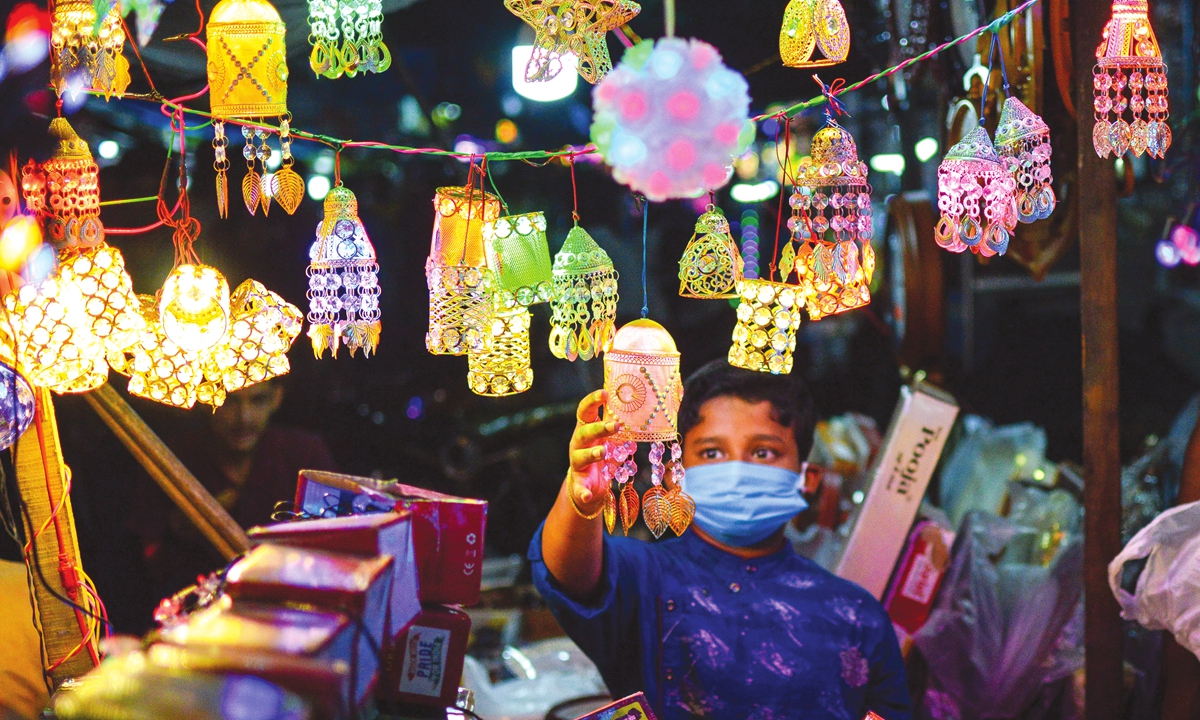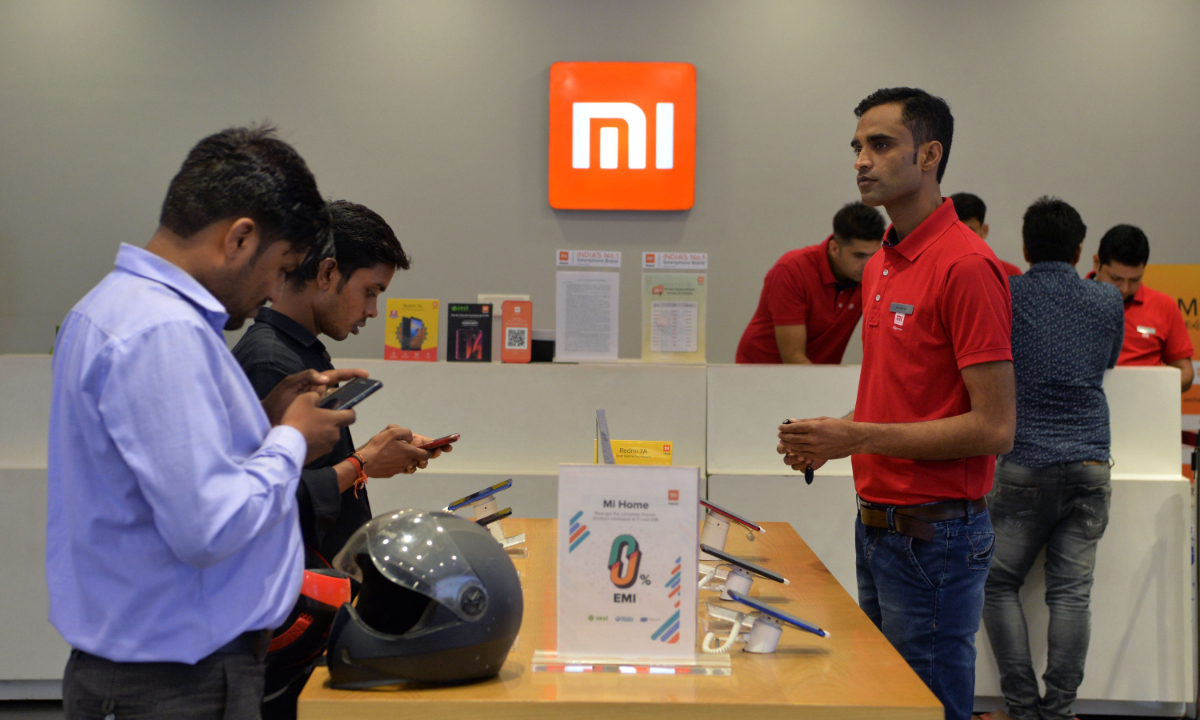Chinese products continue to light up India’s Diwali, as they retain competitive advantage

Colored lights are sold in a market ahead of Diwali celebrations in Kolkata, India. Photo: VCG
Chinese suppliers are gearing up to deliver festive products ranging from LED light decors to stickers as Indian consumers are in a busy preparation for the upcoming Diwali festival, one of the biggest festivals celebrated in the South Asian country, on October 24, which is accompanied by a weeks-long shopping season.
While there is just a week before the annual festival, traders in China are rushing to catch up for their last shipments. Despite the epidemic, inflation and the lingering voices to decouple with China over supply chain among some Indian government officials and media, the orders remain strong, industry insiders and experts told the Global Times.
An employee from Lulin Light Decoration, a local exporter for LED decors based in Taizhou, East China's Zhejiang Province, told the Global Times on Monday that they started delivering festive products to Indian clients since April.
While the festival is drawing near, the company is still busy fulfilling products orders, the person said. The company has been working in full swing to ensure merchandise arrives on time.
"The most popular goods this year are the LED lights for the decoration of curtains… the LED lights designed in shapes like flame or lamp are particularly popular," he said.
A trader surnamed Zhang based in Yiwu, the world's "supermarket," in Zhejiang, has been exporting festive goods to India for five years, building strong connections with Indian clients, for his quality and value-for-money products.
Zhang said that this year's order placement period lasted longer than usual, starting from early April, and tens of thousands of the festive goods have been delivered so far.
"Our products are not only consistent in terms of quality, but we also offer reasonable market prices and timely delivery, and we are flexible about the methods of payment, which are all the reasons why Indian clients like to do business with us," Zhang said.
A set of light decor is priced from 2.8 yuan ($0.39) to about 15 yuan, depending on the style and function. Such a price is almost the same as that of last year, a vendor told the Global Times, even though the production costs have increased as bulk commodity prices have come to a high level this year.
Market talks
While there are no available statistics about how much Chinese-made Diwali-related goods were delivered to India this year, it is possible to gain an approximation of the possible magnitude from the strong orders of Chinese suppliers have taken and India's strong consumer spending figures linked to the festival.
Indian consumers will largely spend money on Diwali supplies, groceries and home renovation items, a survey by LocalCircles, a citizen and community engagement platform, has found, according to livemint.com on September 23.
One in three Indian households plan to spend an estimated 10,000 Indian rupee ($121.5) this festive season, with customer flow volume in stores and markets set to jump by 20 percent, the report said.
Spending during festival season in 2022 could hit $32 billion as Indian households prepare for a restriction free Diwali, according to LocalCircles.
Meanwhile, Chinese LED lights and the corresponding products have gained a rising popularity among Indian consumers, which mirrored data released by the China Chamber of Commerce for Import and Export of Machinery and Electronic Products (CCCME).
In the first half of this year, China exported a total of $710 million-worth of LED light-related products to India, a year-on-year increase of 27.3 percent, a significant 135.3 percent higher than the same period in 2020, data from the CCCME shows.
A failed 'decoupling'
Every year, when Diwali is celebrated, it is always an occasion for some in the Indian media to repeat their unfriendly rhetoric against Chinese products.
This year, there is no exception.
Indian media outlet Financial Express used the provocative headline "Reliance on China: Diwali in dragon's shadow," in an attempt to dramatize India's purchase of Chinese products, while also having to admit that "festivities seem to be incomplete without items made in the neighboring nation - China."
"We noticed that some Indian media are hyping this matter by artificially imposing some difficulties encountered in the current political relations between China and India on the economic and trade relations between the two countries… but they ignored the fact that economic and trade relations are normal people-to-people exchanges and should not be overly politicized," Qian Feng, director of the research department at the National Strategy Institute at Tsinghua University, told the Global Times on Monday.
While the Indian government has relentlessly sought to advance a decoupling with China, following in the US' footsteps, by attempting to replace Chinese products with the Indian ones, there has been little progress.
China has a very mature industrial chain, and has formed an industrial agglomerative economies effect that reduces the operating costs of enterprises and improves labor productivity, so the country can produce a large number of high-quality and inexpensive products in a short period of time. Although India has been vigorously developing its manufacturing industry over recent years, it has not formed the advantages of a full industrial chain, mainly due to the relatively low quality of labor, the lack of support policies covering land and taxation, in addition to less developed infrastructure, Liu Zongyi, secretary-general of the Research Center for China-South Asia Cooperation at the Shanghai Institutes for International Studies, told the Global Times on Tuesday.
"The economic and trade cooperation between China and India is the natural result of the market economy and is a win-win situation, which is also the result of the complementarity of the economic and trade structures of the two countries," Qian said.

